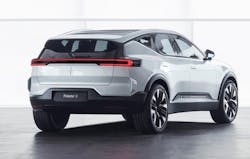Polestar Targets Volume Growth, Double-Digit Margins After Securing $950M Loan
Things may be looking up for Polestar N.V.; the company had a particularly rough 2023 that was marred by wide job cuts, severely reduced production guidance, and ballooning costs. Bridging the gap between its current situation and the optimistic goals executives have set for the end of 2025 will be tough, not to mention expensive. CEO Thomas Ingenlath previously said Polestar would need $1.3 billion to break even by 2025.
On Feb. 28, good news came as executives said the company had secured a three-year, $950 million loan from 12 banks, with BNP Paribas leading the way. Ingenlath said the funding indicated support for the company’s growth course.
“We have reinforced our path towards cash flow break-even targeted in 2025,” he said.
Prior to the news, 2024 has been a bit rough on Polestar. Late January saw another round of layoffs, this time affecting 15% of the company’s global workforce, roughly 450 people. Ingenlath called the reduction “fairly general, in order to drive efficiencies” on a recent business update call.
Just a few days after the layoffs announcement, Volvo Cars, which purchased Polestar and launched it as an EV start-up in 2017, said it would no longer provide funding for the company, as well as sell most of its stake to its own parent company, China’s Geely Holdings.
Volvo CEO Jim Fowan said the company was “well positioned for growth” with the launch of the Polestar 3 SUV and Polestar 4 SUV coupe. Volvo sold most of its Polestar shares but retains an 18% stake in the EV startup.
When the stake sale was first announced, Geely CEO Daniel Li said his team had “strong confidence” in Polestar, and that still seems to hold true with news of the nearly billion-dollar loan.
“[Geely] will retain our shares in Polestar and intend to participate in future financing activities when required,” he said. “Polestar will have full access to technologies and engineering expertise from Geely Holding to realize its global growth targets.”
During last week’s update call, interim CFO Per Ansgar said executives are prepared to raise more money when it’s the “right time.”
“If you ask me as a CFO, would I be happy to have significantly more equity? Yes, I would like to have that,” he said. “So, we are preparing ourselves to fund more equity as soon as we think it’s the right time to do that.”
The 2024 outlook includes ramping up production. In 2023, the company produced 54,600 vehicles, but aims to produce more than 155,000 vehicles annually in 2025. Executives also hope to achieve a double-digit profit margin.
Production of Polestar 3 is set to begin this spring at its South Carolina plant; both it and the Polestar 4 are already in production in China. By the end of the year, the team expects volume growth will support both the 2025 targets.
The company did not provide its full-year 2023 financial and operational results; executives said they intend to release them at a later date. As of Dec. 31, the company had roughly $770 million cash on hand.
Shares of Polestar (Ticker: PSNY) have been on a downward trend over the past six months from their August high of $3.83 per share. It closed at $1.83 per share on Wednesday and, after reporting earnings before the bell, opened at $2.08 per share on Thursday. As of writing, shares are trading at $2.02 per share.
